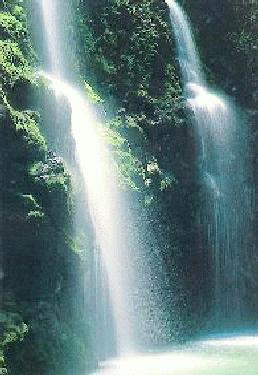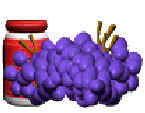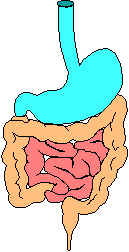 Water
Water Water
Water

¡@
¡@
Water is essential for life. It is a universal solvent. Most organic and inorganic substances can in it to form solutions. All biochemical reactions take place only in aqueous solution. Without water, animals cannot survive. A person can still survive without food for several weeks, but would die in a few days from lack of water.
Water is found in all kinds of food. We can absorb water by drinking it, by taking in it through food: fruits, vegetables, eggs, milk, fish, meat, etc. We can also obtain metabolic water through the process of respiration which occurs in all cells.



![]() Examples of food containing water
Examples of food containing water
Functions:
![]() It acts as a solvent which
dissolves digested products.
It acts as a solvent which
dissolves digested products.
![]() It is a component of blood
and body fluid.
It is a component of blood
and body fluid. 
![]() It takes part in all
biochemical reactions.
It takes part in all
biochemical reactions.
![]() It helps regulating body
temperature by evaporation of sweat from the skin.
It helps regulating body
temperature by evaporation of sweat from the skin.
![]() It dilutes waste products
and poisonous substances in the body, e.g. formation of urine.
It dilutes waste products
and poisonous substances in the body, e.g. formation of urine.
¡@
Absorption of
water:
Since water is already a simple compound which can be readily absorbed by human body, water is not needed to be digested. Absotption of water starts in the stomach, most of it is absorbed in the small intestine, some of it still passes into the colon. Most of this remaining water is absorbed by the colon.
Failure to reabsorb water can result in diarrhoea which lead to serious dehydration and excessive loss of ions.
Gains |
(cm3/day) |
Losses |
(cm3/day) |
drinks |
1400 |
urine |
1500 |
food |
800 |
faeces |
100 |
respiration |
300 |
breath |
350 |
¡@ ¡@ |
¡@ ¡@ |
sweat |
550 |
¡@ ¡@ |
¡@ ¡@ |
¡@ ¡@ |
¡@ ¡@ |
Total |
2500 |
Total |
2500 |
| CARBOHYDRATES | PROTEINS | FATS | VITAMINS | MINERAL SALTS | WATER | DIETARY FIBRES |
¡@
¡@